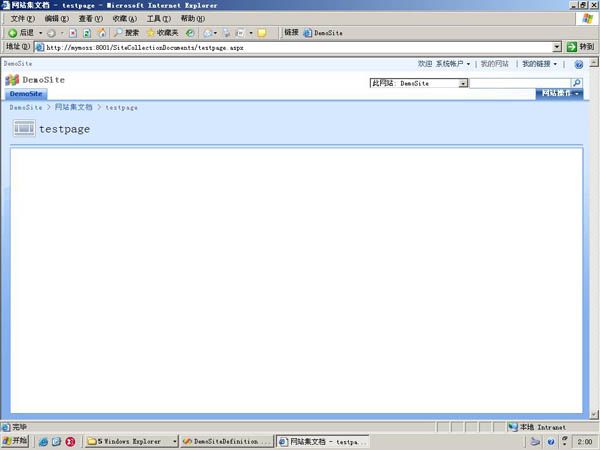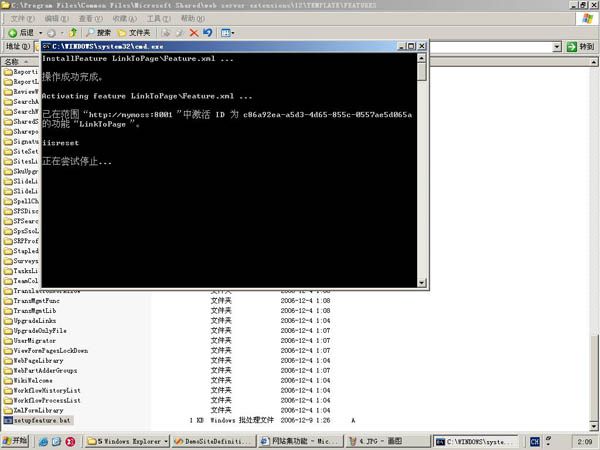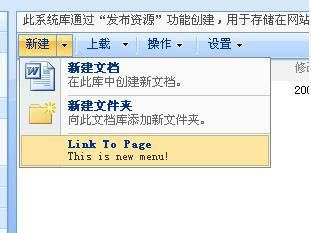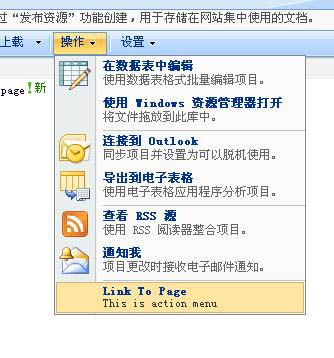MOSS 2007入门(5) : 使用Feature定义站点中的菜单项
前面的文章提到了:Everything is feature.今天就来讲讲feature的使用.在MOSS 2007中feature功能之强大超乎想象,可以说对一个已有的网站功能性的增强最后多数都要通过feature来实现.例如添加webpart,实现Event Handler等等...今天就做一个使用feature定义网站中的菜单项的Demo.
Step(1):在网站中创建一个页面,存放于一个文档库中,这里我创建的页面在文档库SiteCollectionDocuments下testpage.aspx,那么这个页面的引用路径就是<%siteurl%>/SiteCollectionDocuments/testpage.aspx .
Step(2):在12\TEMPLATE\FEATURES文件架下新建一个文件夹叫LinkToPage,在文件夹下创建Feature.xml.内容如下.
 <?
xml version="1.0" encoding="utf-8"
?>
<?
xml version="1.0" encoding="utf-8"
?>
 <
Feature
Id
="C86A92EA-A5D3-4d65-855C-0557AE5D065A"
<
Feature
Id
="C86A92EA-A5D3-4d65-855C-0557AE5D065A"
 Title
="Link To Page"
Title
="Link To Page"
 Description
="This example show how to create a menu linke to a customize page!"
Description
="This example show how to create a menu linke to a customize page!"
 Version
="1.0.0.0"
Version
="1.0.0.0"
 Scope
="Site"
Scope
="Site"
 AlwaysForceInstall
="TRUE"
AlwaysForceInstall
="TRUE"
 xmlns
="http://schemas.microsoft.com/sharepoint/"
>
xmlns
="http://schemas.microsoft.com/sharepoint/"
>
 <
ElementManifests
>
<
ElementManifests
>
 <
ElementManifest
Location
="LinkToPage.xml"
/>
<
ElementManifest
Location
="LinkToPage.xml"
/>
 </
ElementManifests
>
</
ElementManifests
>
 </
Feature
>
</
Feature
>
Feature元素的几个属性说明一下:
Id:这里要使用vs的guid工具生成一个guid,copy过来就可以
Title 和 Description分别是Feature的标题和描述.
Scope这个属性比较重要:是一个枚举值,是用来描述这个feature的作用范围.这里选择:site
AlwaysForceInstall:这个属性设置为true 可以在重复安装这个feature中自动覆盖原来安装的那个相同的feature.
ElementManifest的location属性制定一个描述feature内容的xml文件,这里叫做LinkToPage.xml
Step(3):建立上一步中的LinkToPage.xml,内容如下.
 <?
xml version="1.0" encoding="utf-8"
?>
<?
xml version="1.0" encoding="utf-8"
?>
 <
Elements
xmlns
="http://schemas.microsoft.com/sharepoint/"
>
<
Elements
xmlns
="http://schemas.microsoft.com/sharepoint/"
>
 <
CustomAction
Id
="LinkToPageInactionsMenu"
<
CustomAction
Id
="LinkToPageInactionsMenu"
 RegistrationType
="List"
RegistrationType
="List"
 RegistrationId
="101"
RegistrationId
="101"
 GroupId
="ActionsMenu"
GroupId
="ActionsMenu"
 Location
="Microsoft.SharePoint.StandardMenu"
Location
="Microsoft.SharePoint.StandardMenu"
 Sequence
="1000"
Sequence
="1000"
 Title
="Link To Page"
Title
="Link To Page"
 Description
="This is action menu"
Description
="This is action menu"
 >
>
 <
UrlAction
Url
="~sitecollection/SiteCollectionDocuments/testpage.aspx"
/>
<
UrlAction
Url
="~sitecollection/SiteCollectionDocuments/testpage.aspx"
/>
 </
CustomAction
>
</
CustomAction
>
 <
CustomAction
Id
="LinkToPage"
<
CustomAction
Id
="LinkToPage"
 RegistrationType
="List"
RegistrationType
="List"
 RegistrationId
="101"
RegistrationId
="101"
 GroupId
="NewMenu"
GroupId
="NewMenu"
 Location
="Microsoft.SharePoint.StandardMenu"
Location
="Microsoft.SharePoint.StandardMenu"
 Sequence
="1000"
Sequence
="1000"
 Title
="Link To Page"
Title
="Link To Page"
 Description
="This is new menu!"
Description
="This is new menu!"
 >
>
 <
UrlAction
Url
="~sitecollection/SiteCollectionDocuments/testpage.aspx"
/>
<
UrlAction
Url
="~sitecollection/SiteCollectionDocuments/testpage.aspx"
/>
 </
CustomAction
>
</
CustomAction
>
 </
Elements
>
</
Elements
>
这个xml文件中可以多个CustomAction来描述feature的实际内容,这里采用了两个。
Location和groupid两个属性分别指定该feature是定义了哪两个菜单.
Sequence属性指定新增加的菜单项在这个菜单中的排序,设置的大一点该菜单项排列就靠后.
Title 和 Description分别是该菜单项的标题和描述.
UrlAction属性指定了该菜单项的连接到的页面,当然了,这个demo连接到的是我们在第一步中建立那个页面.这里有一个相对路径的问题,~site 表示站点的主目录, ~sitecollection 表示站点集的主目录.因为我的demo是做在一个站点集下面的,所以采用~sitecollection后面是连接文件的相对路径..
Step(4):下面就是将这个feature部署到站点,因为可能会经常使用到部署feature这样的功能,那么我们写一个通用的bat文件来实现feature的部署,内容如下.
 @rem
======================================================================
@rem
======================================================================
 @rem
@rem @rem setupfeature.bat
@rem setupfeature.bat @rem
@rem @rem
======================================================================
@rem
======================================================================

 @echo off
@echo off setlocal
setlocal pushd .
pushd .
 goto InstallFeature
goto InstallFeature

 @rem----------------------------------------------------------------------
@rem---------------------------------------------------------------------- @rem InstallFeature
@rem InstallFeature @rem----------------------------------------------------------------------
@rem---------------------------------------------------------------------- :InstallFeature
:InstallFeature set SPAdminTool
=
%CommonProgramFiles%\Microsoft Shared\web server extensions\
12
\BIN\stsadm.exe
set SPAdminTool
=
%CommonProgramFiles%\Microsoft Shared\web server extensions\
12
\BIN\stsadm.exe set TargetUrl
=
http://mymoss:
8001
set TargetUrl
=
http://mymoss:
8001
 set FeaturePath
=
LinkToPage\Feature.xml
set FeaturePath
=
LinkToPage\Feature.xml
 echo InstallFeature %FeaturePath%
echo InstallFeature %FeaturePath% 
 "
%SPAdminTool%
"
-o installfeature -filename %FeaturePath%
"
%SPAdminTool%
"
-o installfeature -filename %FeaturePath%
 echo Activating feature %FeaturePath%
echo Activating feature %FeaturePath% 
 "
%SPAdminTool%
"
-o activatefeature -filename %FeaturePath% -url %TargetUrl%
"
%SPAdminTool%
"
-o activatefeature -filename %FeaturePath% -url %TargetUrl%
 echo iisreset
echo iisreset iisreset
iisreset
其中每次只要更改TargetUrl和FeaturePath就可以了,是不是方便了很多.
实际上看这个文件中的内容就知道,通过stsadm命令的-o instanllfeature安装这个feature,然后通过stsadm命令的-o activatefeature激活这个feature,然后iisreset一下.将这个bat文件放在12\TEMPLATE\FEATURES,双击执行就可以.
Step(5):进入站点新建一个文档库,看看文档库的菜单中是不是多出了两项?


到网站设置的网站集功能中看看,是不是有一个Link to Page的feature已经被激活.
Step(6): 通过列表的菜单我们可以链接到刚刚所建立的新页面,但是怎么能通过这个链接传递数据呢?也就是说可以在testpage.aspx中获取列表的Id. ok,将UrlAction更改为<UrlAction Url="~sitecollection/SiteCollectionDocuments/testpage.aspx?listid={ListId}"/> , 保存文件之后重新运行installfeature.bat,新建一个列表,重新使用该功能定位到testpage.aspx,看看是不是能在querystring中获得列表的guid了.
ok,以上就是使用feature来Feature定义站点中的菜单项的DEMO.
Enjoy it....